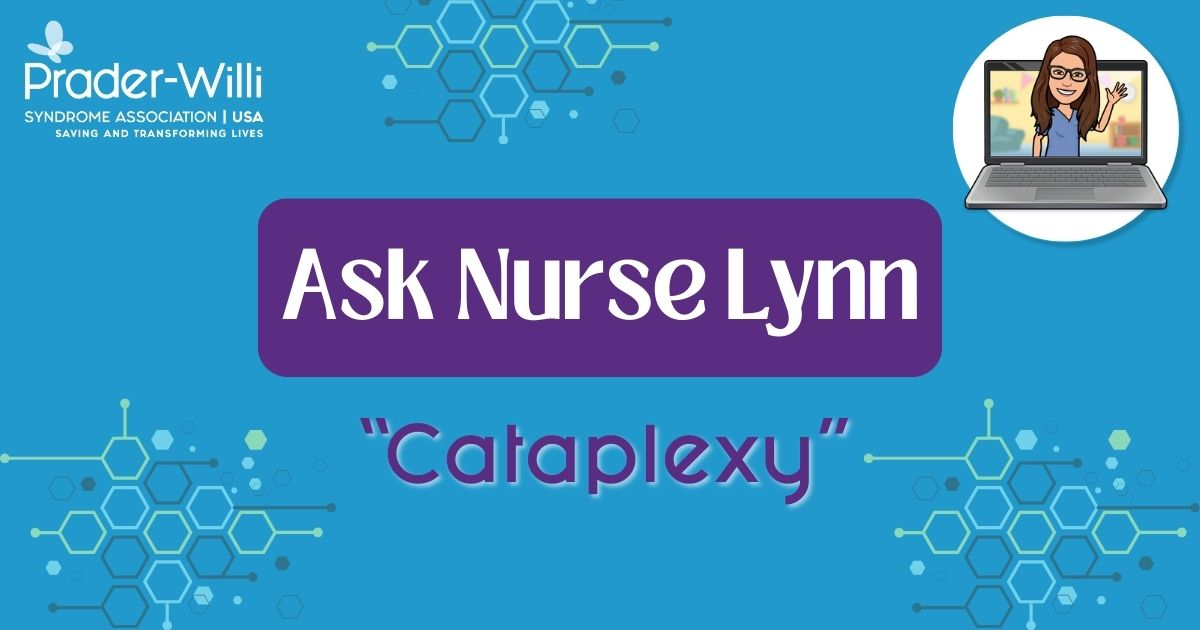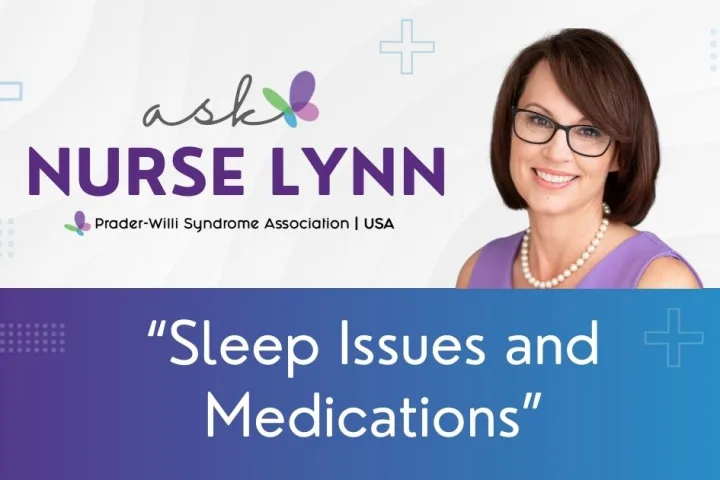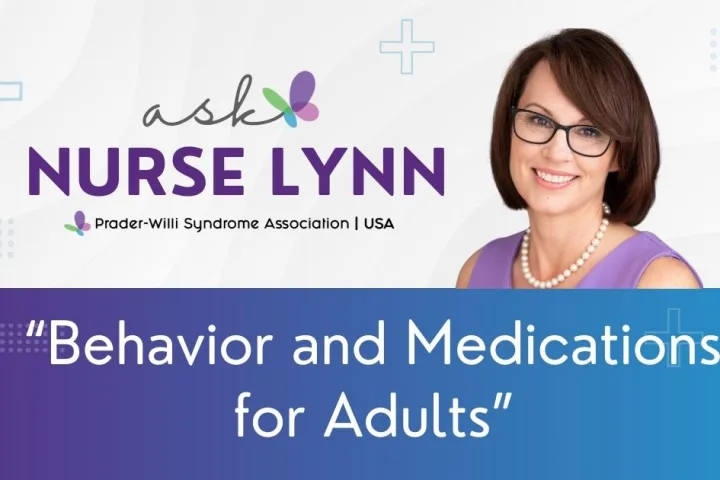Question: My daughter is 12 (deletion). She was never officially diagnosed with cataplexy, but when she was younger there were obvious moments of cataplexy like behavior (usually if she was tired and laughing.) Is it necessary to get an official diagnosis of cataplexy, if so, how is that done, and is it something that people grow out of?
Nurse Lynn’s Answer: Cataplexy falls under the category of disordered sleep. Disordered sleep is common for those with PWS. Remember that the hypothalamus is the part of the brain most important for regulating sleep and appetite (and many other things). It is essential to be evaluated by a medical professional for diagnosis and treatment. Start with your primary physician because many insurance companies will require a referral to a sleep specialist. There may be another medical reason for these episodes, and you want to ensure an accurate diagnosis. Typically, cataplexy is something that will not be outgrown. However, the triggers, severity, and presentation may change with age. Sleep management is an integral part of your child’s overall health, and specialists in this area should be added to your team of physicians. I should note that infants are very rarely, if ever, diagnosed with cataplexy.
Having a diagnosis will be helpful for many reasons. First and foremost, there may be some medications that could be tried. Your daughter is only 12 years old and will be in school for at least another six years. You should include this in her IEP so school staff and support workers know this and can be on the lookout for episodes, provide safety, and keep records of the episodes. As your child ages, the triggers may change for a cataplexy episode, and having records of length of time, time of day, emotional state, etc., will be helpful. When your child enters the workforce, this will be useful information to provide to the employer and the person supporting your child (if needed) at the job site. Involving your child to the extent that they are able is also helpful. Teaching her how to recognize when an episode may occur and how to inform people who support her will be empowering and help her advocate for her health needs.
Below are links to some resources that may be helpful.
Ask Nurse Lynn Your Question:
Share this!





 Perry A. Zirkel has written more than 1,500 publications on various aspects of school law, with an emphasis on legal issues in special education. He writes a regular column for NAESP’s Principal magazine and NASP’s Communiqué newsletter, and he did so previously for Phi Delta Kappan and Teaching Exceptional Children.
Perry A. Zirkel has written more than 1,500 publications on various aspects of school law, with an emphasis on legal issues in special education. He writes a regular column for NAESP’s Principal magazine and NASP’s Communiqué newsletter, and he did so previously for Phi Delta Kappan and Teaching Exceptional Children. Jennifer Bolander has been serving as a Special Education Specialist for PWSA (USA) since October of 2015. She is a graduate of John Carroll University and lives in Ohio with her husband Brad and daughters Kate (17), and Sophia (13) who was born with PWS.
Jennifer Bolander has been serving as a Special Education Specialist for PWSA (USA) since October of 2015. She is a graduate of John Carroll University and lives in Ohio with her husband Brad and daughters Kate (17), and Sophia (13) who was born with PWS. Dr. Amy McTighe is the PWS Program Manager and Inpatient Teacher at the Center for Prader-Willi Syndrome at the Children’s Institute of Pittsburgh. She graduated from Duquesne University receiving her Bachelor’s and Master’s degree in Education with a focus on elementary education, special education, and language arts.
Dr. Amy McTighe is the PWS Program Manager and Inpatient Teacher at the Center for Prader-Willi Syndrome at the Children’s Institute of Pittsburgh. She graduated from Duquesne University receiving her Bachelor’s and Master’s degree in Education with a focus on elementary education, special education, and language arts. Evan has worked with the Prader-Willi Syndrome Association (USA) since 2007 primarily as a Crisis Intervention and Family Support Counselor. Evans works with parents and schools to foster strong collaborative relationships and appropriate educational environments for students with PWS.
Evan has worked with the Prader-Willi Syndrome Association (USA) since 2007 primarily as a Crisis Intervention and Family Support Counselor. Evans works with parents and schools to foster strong collaborative relationships and appropriate educational environments for students with PWS. Staci Zimmerman works for Prader-Willi Syndrome Association of Colorado as an Individualized Education Program (IEP) consultant. Staci collaborates with the PWS multi-disciplinary clinic at the Children’s Hospital in Denver supporting families and school districts around the United States with their child’s Individual Educational Plan.
Staci Zimmerman works for Prader-Willi Syndrome Association of Colorado as an Individualized Education Program (IEP) consultant. Staci collaborates with the PWS multi-disciplinary clinic at the Children’s Hospital in Denver supporting families and school districts around the United States with their child’s Individual Educational Plan. Founded in 2001, SDLC is a non-profit legal services organization dedicated to protecting and advancing the legal rights of people with disabilities throughout the South. It partners with the Southern Poverty Law Center, Protection and Advocacy (P&A) programs, Legal Services Corporations (LSC) and disability organizations on major, systemic disability rights issues involving the Individuals with Disabilities Education Act (IDEA), Americans with Disabilities Act (ADA), and the federal Medicaid Act. Recently in November 2014, Jim retired.
Founded in 2001, SDLC is a non-profit legal services organization dedicated to protecting and advancing the legal rights of people with disabilities throughout the South. It partners with the Southern Poverty Law Center, Protection and Advocacy (P&A) programs, Legal Services Corporations (LSC) and disability organizations on major, systemic disability rights issues involving the Individuals with Disabilities Education Act (IDEA), Americans with Disabilities Act (ADA), and the federal Medicaid Act. Recently in November 2014, Jim retired.